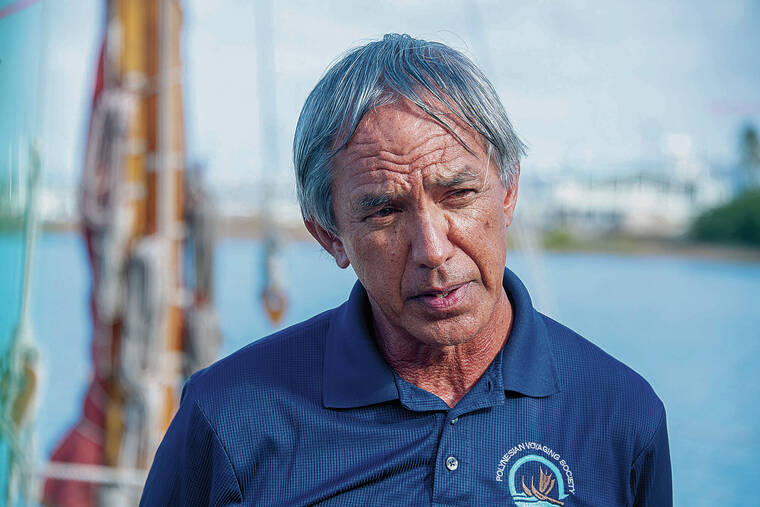The Hokule‘a and Hikianalia canoes will remain in Hawaii waters until March and will focus on training, education and cultural engagement in the state this year, the Polynesian Voyaging Society announced Thursday.
The announcement comes after the Hokule‘a returned to Hawaii from San Diego in December in response to the August wildfires on Maui and unpredictable conditions due to El Nino weather patterns. The severity of El Nino weather conditions was a main reason why PVS decided to keep the canoes mainly in Hawaii waters until March, the organization said.
“In terms of our oceans, we are, in my opinion and not from a scientific point of view, but from just experience over 49 years of sailing this canoe, we’re in a changing ocean and we need to pay attention,” PVS CEO and “pwo” navigator Nainoa Thompson said Thursday in a news
release.
In the meantime PVS said it will go on two deep-sea training voyages to and from the Intertropical Convergence Zone in May through June — an area Thompson said is a “strategic training ground for future captains and navigators.”
“Hawaii is really this web of all of these special training grounds for different reasons, primarily because of our islands and what they do to the winds and the ocean,” he said. “We’re very, very blessed that we have learned to use these islands as a school.”
From June 6 to 16, PVS will also participate in the Festival of the Pacific Arts
&Culture, the “world’s largest celebration of indigenous Pacific Islanders,” according to the festival’s website. The festival invites delegates from throughout the Pacific islands to convene and share culture, art and traditions.
“Within the 49 years of voyaging, we learned so much about who we are, and as the youngest culture, we are but children to the Pacific Islanders,” Thompson said about the festival. “As we were learning how to voyage, they cared for us as family and taught us so much about islands, culture, oceans — teachings needed for our island earth. So for us, what’s most important is that when they return home, they know that they were cared for and that there is a voyaging family in Hawaii that is so grateful.”
Later this year PVS will launch its Pae‘aina, or statewide, sail once the 2024-2025 school year begins. The sail, which is being sponsored by Hawaiian Airlines and Native Hawaiian global business DAWSON, will bring the
canoes to around 30 ports statewide.
PVS is partnering with the state Department of Education, as well as other educational and community organizations, to develop a plan that includes “community outreach, canoe tours, teacher professional development and voyage-inspired curriculum development focused on culture and sustainability,” the release read.
Thompson said, “2024 should be seen as a year of coming home, really paying attention to our children
in our communities and training, training hard and getting ready.”
Following the conclusion of the Pae‘aina sail, the Hokule‘a and Hikianalia will resume their circumnavigation of the Pacific and depart Hawaii for Aotearoa (New Zealand) in March, making stops in major Polynesian island groups before their arrival in December 2025.
The Hokule‘a and Hikianalia are planned to stay in Aotearoa until May 2026 before visiting the islands of Melanesia, Micronesia and Palau until March 2027. The canoes are expected to return to Hawaii in 2028 after stops along the coast of Asia and then in Mexico, Central and South America, major Polynesian island groups, Tahiti and
Taputapuatea.
PVS launched its four-year circumnavigation of the Pacific in Juneau, Alaska, in June. The Hokule‘a traveled through British Columbia and along the West Coast after interacting with First Nations and Native Hawaiian communities and the public in 45 ports, before it returned to Hawaii from San Diego in December.
The canoes’ Pacific circumnavigation will cover approximately 43,000 nautical miles, 36 countries and archipelagos, nearly 100 Indigenous territories and over 300 ports. The circumnavigation is part of PVS’ Moananuiakea Voyage, a global educational campaign focused on uplifting the
importance of oceans and Indigenous knowledge.

